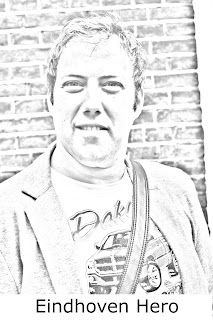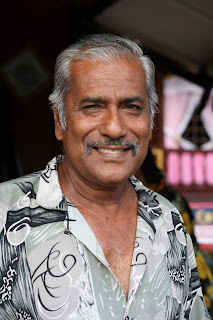 Thalassa from Milk and Cookies
Thalassa from Milk and CookiesFinally started to meet some strangers in Venlo.
This time I want to meet at least some of the strangers again, so I needed to a find a venue. I decided to go with
Milk and Cookie, at Parade 22, Venlo. This is where I met my first Venlo stranger, Thalassa. Thalassa opened Milk and Cookies with her business partner last June.
Thalassa is from Southwest Netherlands, she graduated last year and ever since has been hard at work at Milk and Cookies. She's very approachable and easy to talk with.
Me - "What's a typical Dutch characheristic?"
Thalassa - "Oh, that's 'nuchler', you know?"
M - "No"
T - "Mmm, sober, in the sense of common-sense. We do the right things and get things down"
M - "I understand that Limburger's are different, how is their character different to the rest of the Netherlands?"
T - "I'm not from here originally, but I'm from the south, you know, below the 'river', and close to Belgium, so we are more like Limburgers. We enjoy life, we like to drink and eat. We are more 'bourgondisch', in the north they are more 'nuchler'.
Thalassa enjoys playing with creative ideas and concepts. Milk and Cookies is one of those concepts and her and her partner hope to build this concept by eventually opening more 'Milk and Cookies'.
Since she's working on Sunday, she'll be giving her invite to a friend. So, there'll be at least one mystery guess on Sunday.
 Thea
TheaI met Thea and Annie where Venlo has its Saturday market. They were heading towards town, my guess towards a cafe but I didn't ask. Thea did most of the talking because I have no Dutch and she has reasonable English.
M - What are the Dutch like?
T - Friendly, helpful.
 Annie
AnnieM - And what about Limburgers?
T (ask Annie in Dutch) They enjoy life a lot. They love talking, they're good to guests and the carnival is big here. Everyone loves it.
M - What do you do for enjoyment?
T - We like going to cafes.
 Frans from Pieter Breughel Art Shop
Frans from Pieter Breughel Art ShopFrans is the owner of the
Pieter Breughel Art Shop
, which sells modern paintings and sculptures. He's enjoyable to talk to, likes to play golf because it gives him pleasure and enjoys going out restaurants and for some drinks. He also wished me much success, which I liked.
Me - "Are you from Limburg?"
Frans - "Yes, I'm from Venlo."
M - "Do people from the Netherlands have a special characteristic? You know, like the British are considered to be gentlemen, they like to drink etc."
F - "They are humorous, I like English humour. Yes, the Dutch are friendly, and they're open-minded."
M "Yes, the British consider the Dutch to be open-minded that way so many of them like coming here. You're from Limburg. Do you think they are different to other Dutch people?"
F - "Yes, Limburgers like the good things in life, we like to eat and drink, we like to talk and there's the carnival too. Also, now means now in the north but here it could mean in 15 mins"
M - "Why do you think there's a difference?"
F - "Limburg is made up of a lot of small places. Each of those places has their own orchestra and carnival group."
M - "Yes, I kinda know this. In Stejl they have something like this, in English they're called 'Circle of Friends' and they have a red flag with a devil on it. I don't understand why they use the devil?"
F - "I don't really know either, you'll have to ask people in Stejl but they are well known and they're the only one like this in the whole of Limburg.
 Eindhoven Heroes
Eindhoven Heroes
 Yoram
Yoram
 Eindhoven Hero
Eindhoven Hero
 Dennis
Dennis
 Eindhoven Hero
Eindhoven Hero
 Naomi
Naomi
 Eindhoven Hero
Eindhoven Hero
 Eileen
Eileen
 Eindhoven Hero
Eindhoven Hero
 Aziz and Fatima
Aziz and Fatima Milik Ahmed, owner of the house
Milik Ahmed, owner of the house Traditional Malay House
Traditional Malay House Me sitting in a cute Malay house
Me sitting in a cute Malay house Jason didn't wanted to be photographed, which is surprising as he's handsome and has an intelligent look. Anyway, no portrait but some pictures from the city he loves - Malacca
Jason didn't wanted to be photographed, which is surprising as he's handsome and has an intelligent look. Anyway, no portrait but some pictures from the city he loves - Malacca Interior of a Nyonya House - Baboon House in this case
Interior of a Nyonya House - Baboon House in this case Thalassa from Milk and Cookies
Thalassa from Milk and Cookies Thea
Thea Annie
Annie Frans from Pieter Breughel Art Shop
Frans from Pieter Breughel Art Shop This is Thomas, my second guide to Melaka
This is Thomas, my second guide to Melaka Thomas next to his noodle stall - food's very cheap here
Thomas next to his noodle stall - food's very cheap here Woman burning incense sticks - in the week of Guanyin's Birthday
Woman burning incense sticks - in the week of Guanyin's Birthday Photos and memorial plaques for the dead
Photos and memorial plaques for the dead Birds being released at the Temple
Birds being released at the Temple The Fortune Teller
The Fortune Teller The Pregnant Woman
The Pregnant Woman The Person who practices on the street
The Person who practices on the street The Masseuse who uses a meat cleaver
The Masseuse who uses a meat cleaver The Student
The Student Ray, outside Red Handicraft
Ray, outside Red Handicraft Shellfish at the roadside place Ray recommended
Shellfish at the roadside place Ray recommended The crowd at the roadside cafe
The crowd at the roadside cafe The cosmetic girl with a present from King Kong, the musician
The cosmetic girl with a present from King Kong, the musician The Musician - King Kong
The Musician - King Kong The Police Man
The Police Man The Falun Dada follower
The Falun Dada follower The Artist
The Artist Cowboy Lim - the first famous trishaw driver in Malaka
Cowboy Lim - the first famous trishaw driver in Malaka Mother and son releasing birds on Guanyin's Birthday
Mother and son releasing birds on Guanyin's Birthday Me and Tan Hoon Keong at La salle's St Joseph School
Me and Tan Hoon Keong at La salle's St Joseph School Some school children taking photos at St Paul's Church
Some school children taking photos at St Paul's Church A woman visiting a temple for Guanyin's birthday
A woman visiting a temple for Guanyin's birthday The Gay Man - from the Taipei 101 series
The Gay Man - from the Taipei 101 series The Spicy Boy; from the Taipei 101 series
The Spicy Boy; from the Taipei 101 series The Betelnut Girl - from the Taipei 101 series
The Betelnut Girl - from the Taipei 101 series The Bin Man - from the Taipei 101 series
The Bin Man - from the Taipei 101 series Xinyi, outside the Sun Yat Sen Museum
Xinyi, outside the Sun Yat Sen Museum Jessie and Xinyi
Jessie and Xinyi Kheng
Kheng Xu, Guo Zhen, a photographer with 10s of trophies; outside his wife's restaurant on Cimei
Xu, Guo Zhen, a photographer with 10s of trophies; outside his wife's restaurant on Cimei Hygeia and Xingyi looking gorgeous on the sunny island of Cimei. Xu, Guo Zhen suggested the composition, one I think works well. (Certainly better than the other two portraits this time round)
Hygeia and Xingyi looking gorgeous on the sunny island of Cimei. Xu, Guo Zhen suggested the composition, one I think works well. (Certainly better than the other two portraits this time round) Xun,Cha Ya runs Erkan Min Shu, a guest house where people can stay in traditional style houses. Sorry about the portrait, not one of my better ones :(
Xun,Cha Ya runs Erkan Min Shu, a guest house where people can stay in traditional style houses. Sorry about the portrait, not one of my better ones :(  Erkan Village, a village with lots of traditional houses that are still lived in.
Erkan Village, a village with lots of traditional houses that are still lived in.